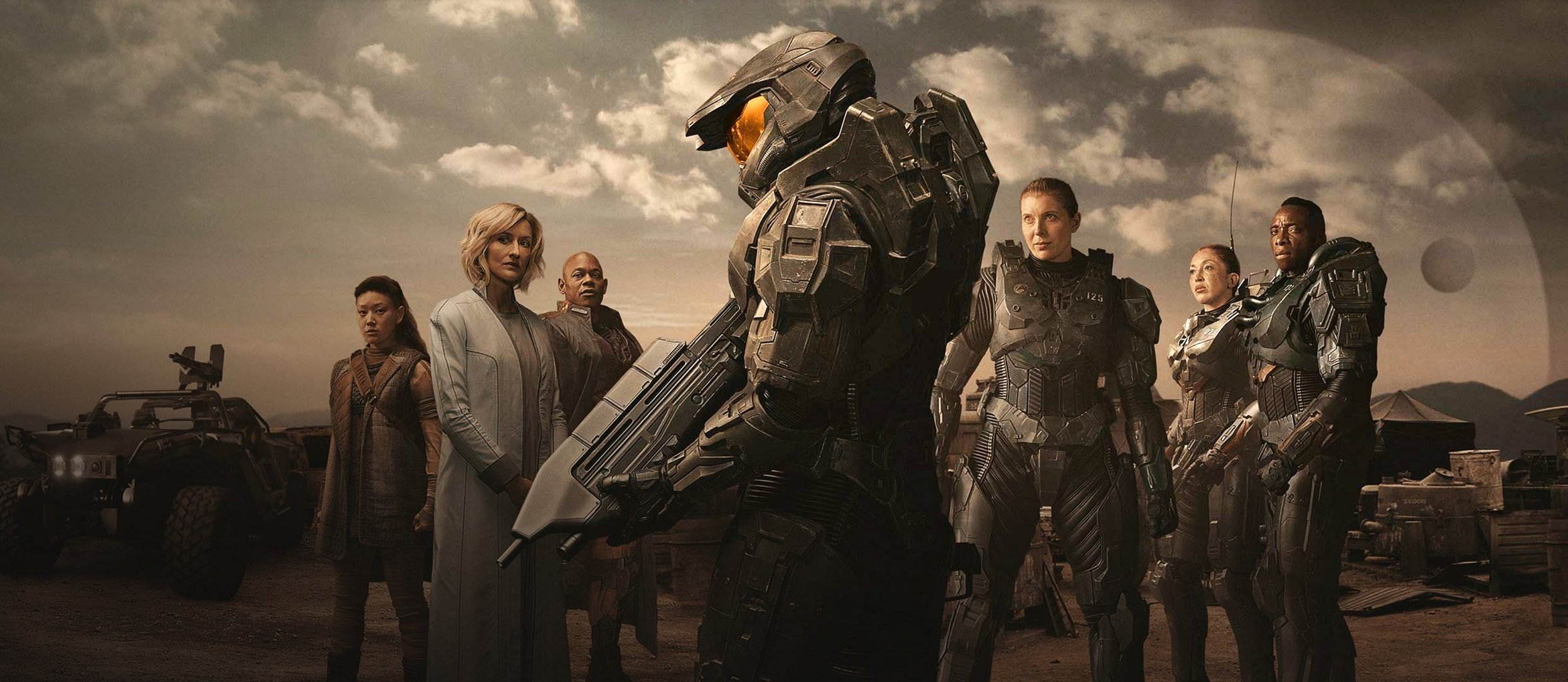“Find the Halo, win the war.”
It has been just over a day since the first episode of the Halo Television Series, Contact, released and having just recently watched it, I wanted to write down my initial thoughts and opinions on what I saw, felt, and think of Halo’s first real entry into live-action television. While I will try to not get into too much detail, this article will inevitably have spoilers for the show, so reader beware!
For some quick background before I get started, I have always been a huge supporter of the Halo TV Series, even when the community reacted poorly to certain bits of news that we got about the story, casting, and canonicity. A TV series is, in my opinion, the best medium for telling the Halo story, namely because it can actually show the combat scenes that are such an integral part of the video games, while diving into the complex and murky lore that the novels have been able to explore and expand on to this point. Characters like Chief, Halsey, Parangosky and the like are really interesting characters because of how much they operate in the gray zone of morality, but that hardly gets touched on in the games, and has been at times inconsistently covered in the books. Television is perfect for character development, which is, in my opinion, the key to any good story, whether it is science fiction or a comedy.
Related Media
The following article will discuss major plot points related to episode one of the Halo TV Series..
Part One - Insurrection
The opening scene places us on Madrigal, a human outer colony populated exclusively by insurrectionists. It appears to be mostly desert, at least the area that we see, and the only purpose of this colony is seemingly to mine deuterium (heavy water) for humanity’s fusion reactors. While the setting is interesting, this scene immediately raises a lot of questions. For one, it is 2552, so in-canon this would be the end of the war, yet as far as we can tell the insurrectionists, or at least these innies, are completely unaware of the Covenant at all. For someone steeped in the lore this seems super weird, but of course the show is a separate canon, so this isn’t technically an issue.
The colony of Madrigal from the Halo Television Series.
My problem right off the bat is in how the universe is presented. Yes, there always could be a canon explanation for why a group of innies 25 years into the war don’t know who the Covenant are, but the way it comes off, and as far as I can tell the way it is supposed to come off, is that this war just started recently, which is of course not in the core canon. But we already know this isn’t core canon, so why am I getting stuck on this?
I think my issue boils down to feeling, and not how I feel about the show, but how the show makes the universe feel. By 2552, the start of Halo: Combat Evolved, the UNSC felt war weary, and they should have been. The war at that point had been going on for nearly three decades and they were slowly but surely losing to the Covenant. I just don’t get that feeling at all here. That is unfortunate, because one of my favorite things about the Halo universe is how it always managed to paint the UNSC as the David to the Covenant’s Goliath, yet at the same time paint the Insurrectionists the David to the UNSC’s Goliath. I love that dichotomy, though it is rarely realized to its full potential in the core canon either.
Of course knowing the little bits about the show that we do outside of the first episode, the timeline kind of has to be roughly the same duration I think. Silver Team are clearly grown adults in this show, so they are hardened veterans by 2552 in the Silver Timeline too. So maybe this initial setup is just done for simplicity’s sake, but either way it feels weird to me.
The second issue I have is just how generic the innies feel in this opening scene. I kind of figured this would be the case, but I held out hope for better character development. At least for this scene, we don’t get any chance for that as all but one of the innies dies, leaving just a single survivor, Kwan Ah. She is actually pretty good throughout the first episode, so I have hope for that character, but the entire rest of the insurrectionists felt super generic and meaningless.
I did enjoy the brutality of the Covenant attack. Animation was a little weird to me throughout, but seeing the Covenant indiscriminately blowing off limbs and heads did help to set them up as a serious threat. They even went all Order 66 on a bunker full of children while the father of one (who managed to get away just before) watches helplessly in horror. This scene could have used some longer setup to really dial up the emotional impact, but it was a brutal scene none-the-less.
The rest of this scene plays out fairly standard. Silver Team saves the day, though without saving anyone outside of the one protagonist. They investigate what the Covenant were excavating, only to find a weird Forerunner artifact. What struck me here is that this isn’t just taking the universe back to a time before the Forerunners were well known. It is taking the universe to a place where the Forerunners are entirely unknown. This is actually saying something, because while the UNSC and humanity generally don’t know much about the Forerunners in 2552 in core canon, ONI including Dr. Halsey, had found several Forerunner artifacts they were actively investigating. It is really a minor change in the end, but it is again kind of a strange choice that makes the universe feel very different overall.
Part Two - Fleetcom
We get introduced to most of the rest of the main cast in the following scenes, meeting Dr. Halsey, Captain Keyes, Miranda Keyes, and Admiral Parangosky. This part again felt very different than core canon, and in my opinion not for the better. ONI and the UNSC are kind of one and the same here, at least in how it is presented, and they come off as the all-powerful jackboot, not yet on the backfoot due to decades of fighting a losing war. This is another time when you could make a canonical reason why the UNSC is acting this way despite actually being on the losing end of a genocidal war against humanity, but the presentation seems clear that they are meant to seem tough and menacing. Its a minor issue, but an issue none-the-less.
There are parts of this that I really enjoyed too though. Captain Keyes, played by Danny Sapani, is excellent. He does seem a bit too willing to tow the murderous ONI/UNSC orders given, but his performance is excellent. I really look forward to seeing more of him.
The same goes for Natascha McElhone. Her Halsey is really good so far, and while I am still wary about how the entire show and by extension Halsey is portrayed as a blend of early war and late war themes, her performance has been really good.
The other two main characters we meet in this show are Miranda Keyes played by Olive Gray and Admiral Parangosky played by Shabana Azmi. Honestly I wasn’t that thrilled with either performance in this first episode, particularly that of Miranda. The performance felt a bit weak, and I didn’t get the sense of authority from her that I felt in the Miranda from the games. Maybe this is purposeful for the characters’ growth over the season and series, but the initial impression of the character felt a little weak.
As for the presentation of Fleetcom/ONI/the UNSC overall, I mostly enjoyed it, though as I said above, I felt more like this was pre-war UNSC rather than the beaten down and scrappy UNSC we get more of in the games. This is another one of those things that may develop over the course of the show, so I will have to revisit this later on in the season.
Part Three - Prophet
We only get the briefest of introductions to the Prophet of Mercy and Makee during this episode. This is a plot thread that will clearly drive the story, pitting John and Silver Team against her and whatever entourage of Covenant she will have at her disposal. I am a little lukewarm on this part of the story, though. I know this entire part of the story was panned by the Reddit and Twitter mobs, but I actually defended it as reasonable and logical, given the right context. Now that we know some of the context, I don’t hate it, but I don’t love it either. Time will tell how this plays out, but the interaction between Makee and Mercy felt off. Maybe it is just the CG, which feels great in some of the show, and in others feels very uncanny valley. I am interested in how this develops though, so I will hold my full judgement until later in the season.
The Prophet of Mercy, from the Malo Television Series.
Part Four - Control
The final couple scenes are what bothered me the most. As John returns with Kwan having defied the order to execute her,, seemingly for the first time ever, ONI/UNSC/Fleetcom mobilize to stop him, first by maintaining autopilot of the Condor John is in, then cutting off the oxygen to the ship and his suit. John manages to take control over both the ship and his life, but this entire sequence feels like Robocop in space. John is effectively an automaton up to this point in the Silver Timeline, which doesn’t really jive with core canon either from a timeline perspective or a character perspective. The UNSC treats the Spartans purely as military hardware, which does fit in with core canon, just not to this degree. John isn’t even trusted to fly the ship back home, and the UNSC somehow manages full control over his Mjolnir remotely.
This scene does touch on one of the most important and interesting parts of the lore for me, the conflict between duty and free will, but the show is very heavy-handed with the idea, and the entire transition from John being a soulless killing machine to making a choice to save Kwan takes place in under ten minutes. Don’t get me wrong, it makes for an interesting story, but I feel like the way this first episode has handled many of the broader themes and ideas from the Halo universe needs more nuance and a lot more time to develop.
Part Five - Summary
Overall this episode does an alright job of introducing the universe to new fans, and it does make the point to hit the major story themes I think it has to in order to be a compelling narrative beyond just a story about killing aliens. I really like that they didn’t shy away from being fairly graphic with the violence, and I am hopeful that continues, if only to highlight the hardship endured by the war with the Covenant. I am pretty lukewarm about the setup of the Silver Timeline in general, though it may grow on me as I adjust to the new canon and I am no longer surprised by a major changes to the universe. I still don’t like how they seem to have mixed the feeling of early and late war together, but again this may grow on me as I settle into the realities of new canon.
Characters are so far pretty good. I like Pablo Schrieber, Danny Sapani, and Natascha McElhone a lot in their roles. the others aren’t terrible, but they didn’t wow me at all. I will have to wait and see if that improves over the course of the season. We didn’t really get any good introduction to the rest of Silver Team outside of combat, so I am withholding judgement until I see more of them.
I will admit, the fact that this is a separate canon is a bit of a turnoff for me. The building of the universe over the past 20 years is one of the things that really interests me in Halo. I completely understand why it was done, and given the realities of show development I think it was the right choice. I can’t help but think, however, that I would have really preferred an in-canon show, even if it meant the show was stuck retreading some of the established lore. I am not going to hold this against the producers, though, since that would probably have been nearly impossible to manage.
My overall score for this episode is going to be a 6/10. Not terrible, but the show didn’t wow me and has some flaws with how it presents some characters and themes. I am looking forward to the rest of the season, though I am more skeptical that it will wow me like I had originally hoped.









